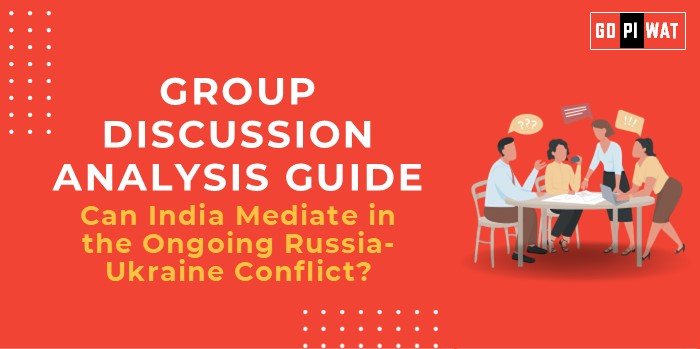📋 Group Discussion Analysis Guide
🌟 Can India Mediate in the Ongoing Russia-Ukraine Conflict?
🌐 Introduction
As the Russia-Ukraine conflict continues to escalate, India’s position as a neutral party with strong ties to both Russia and the West has sparked discussions about its potential role as a mediator. With significant geopolitical stakes and a history of non-alignment, India’s ability to navigate this conflict could redefine its global diplomatic standing.
📊 Quick Facts and Key Statistics
- ⚔️ Russia-Ukraine Conflict Casualties (2024): As of December 12, 2024, Russian military casualties are estimated at approximately 758,730.
- 📈 India’s Trade with Russia (2022-23): Reached $39.8 billion, driven by discounted oil imports.
- 🗳️ India’s UN Voting Record: Abstained from multiple UN resolutions condemning Russia, including a February 2023 vote with 141 nations supporting, 7 opposing, and 32 abstaining.
- 💼 Global Arms Import Share (2023): India accounted for 9.8% of global arms imports between 2019–2023, with Russia as a key supplier.
🤝 Stakeholders and Their Roles
- 🇮🇳 Government of India: Potential facilitator in peace talks due to its strategic partnerships and non-aligned stance.
- 🇷🇺🇺🇦 Russia and Ukraine: Primary parties in the conflict whose diplomatic ties with India influence the feasibility of mediation.
- 🏛️ United Nations: Pressuring nations like India to take proactive roles in conflict resolution.
- 🌍 Global Community: Observing India’s stance for implications on energy security and geopolitical stability.
🏆 Achievements and Challenges
✅ Achievements:
- Maintained robust trade relations with Russia despite global sanctions.
- Retained diplomatic neutrality, strengthening credibility in multilateral platforms like G20.
- Secured energy security through significant Russian oil imports.
⚠️ Challenges:
- Balancing strategic partnerships with Russia and growing ties with the West.
- Addressing skepticism over India’s abstentions in UN votes.
- Limited experience in mediating large-scale international conflicts.
🌍 Global Comparisons
- 🇹🇷 Turkey’s Role: Successfully mediated the Black Sea Grain Initiative, offering a model for neutral diplomacy.
- 🇸🇪 Sweden’s Neutrality: Demonstrates the potential of non-aligned nations in conflict resolution.
🗣️ Effective Discussion Approaches
🔑 Opening Approaches:
- Cite India’s consistent neutrality and trade ties with both Russia and Ukraine as a foundation for mediation.
- Reference global precedents, such as Turkey’s success in the Black Sea deal.
🛡️ Counter-Argument Handling:
- “While India has deep trade ties with Russia, its abstention from UN resolutions ensures it retains credibility as a neutral party.”
📊 Strategic Analysis of Strengths & Weaknesses
✅ Strengths:
- Long-standing ties with Russia.
- Credibility on the global stage as a non-aligned power.
⚠️ Weaknesses:
- Dependence on Russian energy and defense imports.
- Limited track record in mediating high-stakes conflicts.
🌟 Opportunities:
- Showcase leadership in global peacekeeping.
- Strengthen multilateral engagement through mediation efforts.
⚡ Threats:
- Risk of alienating key trade partners like the US or EU.
- Potential backlash from either side in the conflict.
📋 Structured Arguments for Discussion
- 🟢 Supporting Stance: “India’s neutral stance and economic ties make it uniquely positioned to mediate effectively.”
- 🔴 Opposing Stance: “India’s heavy reliance on Russian defense imports compromises its neutrality.”
- ⚖️ Balanced Perspective: “India’s ability to mediate depends on leveraging its neutrality while balancing global expectations.”
🎓 Connecting with B-School Applications
🌍 Real-World Applications:
- 💼 Understanding the intersection of trade, diplomacy, and conflict resolution in global business strategy.
❓ Sample Interview Questions:
- 💬 “How can India’s diplomatic strategy in the Russia-Ukraine conflict shape its global image?”
- 🌍 “What lessons can India learn from Turkey’s mediation success?”
💡 Insights for B-School Students:
- 📘 Develop expertise in geopolitical risk analysis.
- 🌐 Explore conflict resolution strategies applicable to international markets.


